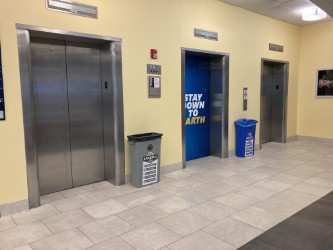If one had to describe an elevator in three words: leaky, shaking and untrustworthy wouldn’t be the first thing most students think of – unless you’re talking about the Kent State library.
Over five decades old, the Kent State library elevators are the original models from 1970, and it’s easy to tell. Unlit buttons, rough shaking, oil leaking from the lights, to even going to the wrong floor, the three library elevators are overdue for a remodel.
Students aren’t the only ones who seem to think so, as $10 million has been allocated to go towards an elevator modernization project, after the Board of Trustees of Kent State University approved the remodel in a September 2024 meeting. There’s just one caveat: patience.
Construction at the library is slated for the beginning of 2026. Six million dollars will go towards the new library elevators and $4 million to four other elevators across campus.
“Over the course of the next two years, we’ll be shutting those [elevator] cars down. One, maybe two cars at a time, and we’ll be modernizing them,” said John Mann, the preventative maintenance planner for University Facilities Management. “So, we’ll be tearing all that stuff out and we’ll be building brand new elevators in the existing elevator shafts.”
The Kent campus has 130 elevators across campus. UFM hired a firm to assess all of Kent’s elevators that broke down most often and were the oldest, then ranked them from highest to lowest priority, Mann said.
Molten Hall, Satterfield Hall, The Center for Performing Arts and Rockwell Hall were the top four.
“The elevators we listed as our [worst] elevators are in buildings that are single-elevator buildings,” he said. “As you could imagine, figuring out a time where you could take that elevator offline for two years, … we have to take that into consideration.”
Accessibility isn’t a concern to just UFM. Malea Cobb, a junior fashion design major, thinks the renovation is long-awaited, but also hesitates about the two-year-long estimate.
“People in wheelchairs, stuff like that, who can’t take the stairs, they might need that accessibility,” she said.
However, students with accessibility issues aren’t just left to fend for themselves. When an elevator has to be disabled, Mann contacts the building curator and the Division of People, Culture and Belonging to make sure students aren’t missing opportunities.
The two most common solutions are either letting the student take the class online or moving the class to a first-floor room.
“We will move an entire classroom if an elevator goes down and we cannot figure out another way to get that student taken care of,” he said.
Mann knows incoming students won’t understand why some of the elevators are shut down, but student comfort will always be UFM’s first priority.
A lot of Mann’s time is dedicated to making sure the campus elevators are functioning, and if there’s a problem, contacting the right people to resolve it as quickly as possible.
“While the students are the heart of university – no question about it – we’re the heartbeat,” he said. “We’re the ones that keep everything going.”
Aryn Kauble is a reporter. Contact him at [email protected].



